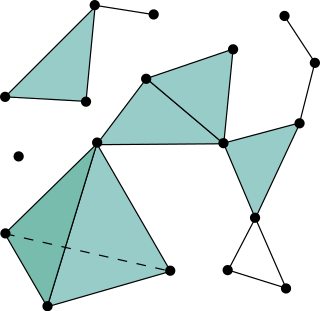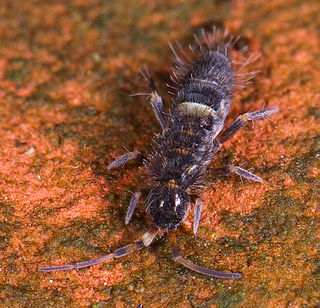
In geometry, a simplex is a generalization of the notion of a triangle or tetrahedron to arbitrary dimensions. The simplex is so-named because it represents the simplest possible polytope in any given dimension. For example,

Linear programming (LP), also called linear optimization, is a method to achieve the best outcome in a mathematical model whose requirements and objective are represented by linear relationships. Linear programming is a special case of mathematical programming.

In mathematics, a simplicial complex is a set composed of points, line segments, triangles, and their n-dimensional counterparts. Simplicial complexes should not be confused with the more abstract notion of a simplicial set appearing in modern simplicial homotopy theory. The purely combinatorial counterpart to a simplicial complex is an abstract simplicial complex. To distinguish a simplicial complex from an abstract simplicial complex, the former is often called a geometric simplicial complex.
In mathematical optimization, Dantzig's simplex algorithm is a popular algorithm for linear programming.

Herpes simplex virus1 and 2, also known by their taxonomic names Human alphaherpesvirus 1 and Human alphaherpesvirus 2, are two members of the human Herpesviridae family, a set of viruses that produce viral infections in the majority of humans. Both HSV-1 and HSV-2 are very common and contagious. They can be spread when an infected person begins shedding the virus.

Epidermolysis bullosa simplex (EBS) is a disorder resulting from mutations in the genes encoding keratin 5 or keratin 14. It is one of the major forms of epidermolysis bullosa, a group of genetic conditions that cause the skin to be very fragile and to blister easily.

Herpes simplex, often known simply as herpes, is a viral infection caused by the herpes simplex virus. Herpes infections are categorized by the area of the body that is infected. The two major types of herpes are oral herpes and genital herpes, though other forms also exist.

A cold sore is a type of herpes infection caused by the herpes simplex virus that affects primarily the lip. Symptoms typically include a burning pain followed by small blisters or sores. The first attack may also be accompanied by fever, sore throat, and enlarged lymph nodes. The rash usually heals within ten days, but the virus remains dormant in the trigeminal ganglion. The virus may periodically reactivate to create another outbreak of sores in the mouth or lip.

Orchesella is a genus of springtails belonging to the family Entomobryidae. This genus includes springtails with subdivided basal antennal segments.
O. leucocephala may refer to:

Orchesella cincta is a species of springtail present in North America and Europe. They average 4 millimetres (0.16 in) in length, which is extremely large as most springtails don’t grow past 1 millimetre. The specific name cincta means "belted" and refers to the distinctive colouration of the third abdominal segment.
Orchesella alpa is a species of slender springtail in the family Entomobryidae.
Orchesella alticola is a species of slender springtail in the family Entomobryidae.
Orchesella angustistrigata is a species of slender springtail in the family Entomobryidae.
Orchesella balcanica is a species of slender springtail in the family Entomobryidae.
Orchesella bulba is a species of slender springtail in the family Entomobryidae.
Orchesella fishmani is a species of slender springtail in the family Entomobryidae.

Orchesella flavescens is a species of slender springtail in the family Entomobryidae. It is found in Europe. It is found predominantly in late spring and beginning of summer.
Orchesella sporadica is a species of slender springtail in the family Entomobryidae.

Graduale simplex is a gradual in Latin and in Gregorian chant, published by the Vatican in 1967 following the Second Vatican Council, so that the use of Gregorian chant can adapt to smaller parishes and churches or to those who lack experienced choirs.








